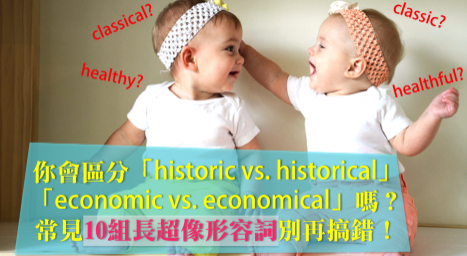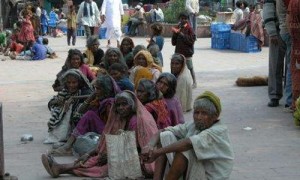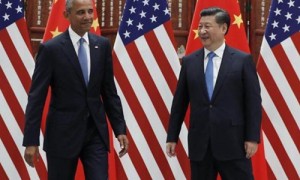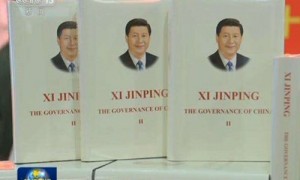名词常会衍生多个形容词,
这些形容词的长相通常会非常相似,
差别往往在字尾几个字母,
但是意思却可能差很大,
VT带来10组常见的易混淆形容词,
让你一次搞懂,精准用字!
1. Historic vs. Historical
historic:有历史重要性的;具历史意义的
e.g. Kyoto is famous for its historic sites which have been well-preserved.
京都以保存良好的古迹闻名。
historical:过去的
〈小技巧〉很多英汉字典会翻译「与历史有关的」,但这样容易与 historic 的意思产生混淆,小编建议直接把 historical 理解为「过去的」比较不会搞混喔。
e.g. He ate twenty bowls of beef noodles in 30 minutes, breaking the world’s historical records.
他在三十分钟内吃完二十碗牛肉面,打破世界历史纪录。

2. Healthy vs. Healthful
在现代日常英文里,这两个字的意思其实差不多,连老外自己都常相互通用,到底什么时候用哪个字才是对的?到现在还是有很大的争议,但是在正规的英文用法里,这两个字还是有区别的喔。
healthy:是指个体本身是「健康的、健全的」状态,而个体可以是人、动物或某件事物,也可以用来形容「经济景况」。
e.g. The country’s economy was not healthy because of the rapid increase of oil price.
由于急剧上涨的石油价格,那国家的经济很不景气。
e.g. He is a healthy person who keeps a habit of getting up early in the morning.
他是一个习惯早起的健康之人。
healthful:有益健康的,实质上对人身心健康有益的,比如水果、运动、养宠物等都可以有益身心,换句话说,会说 a healthy person,而不是 a healthful person,小心别误用啦!
e.g. Today, having a healthful diet is difficult for those eating outside every day.
在今日,健康饮食对外食族来说是一件难事。
3. Economic vs. Economical
economic:经济上的
e.g. The developing country has seen a stable economic growth over the past two decades.
这个发展中国家从过去二十年以来,面临持续稳定的经济成长。
economical:节约的、有经济效益的
e.g. It’s more economical to buy in bulk.
大量购买比较省钱。
4. Intense vs. Intensive
intense:强烈的、激烈的;极度、非常的
e.g. She has an intense desire to learn new things.
她对学习新事物有很强烈的欲望。
intensive:密集的
e.g. Professional athletes have to undergo intensive training.
专业运动员都必须历经密集训练。
e.g. Most of the farmers in Taiwan engage in intensive agriculture.
大部份台湾农夫从事集约农业。
〈补充〉knowledge-intensive 知识密集的
5. Classic vs. Classical
classic:经典的、典型的
e.g. Pride and Prejudice is a classic novel that you should read.
《傲慢与偏见》是一本你必看的经典小说。
classical:古典的
e.g. I always listen to classical music in my spare time.
我总在闲暇时听古典音乐。
6. Sensitive vs. Sensible
sensitive:敏感的
e.g. She is sensitive to others’ words and always gets hurt easily.
她对别人的话语很敏感,总是很容易因此受伤。
sensible: 合理的;明智的
e.g. A sensible person can stay calm and think carefully before making a decision.
一个理智的人再做决定前会保持冷静、仔细思考。
7. Fun vs. Funny
fun:好玩的、有趣的
e.g. Betty is really a fun person to be around.
Betty真的是个有趣又好相处的人。
funny: 好笑的;搞笑的、奇怪的
e.g. The comedian is so funny that I can’t help but laugh continuously.
这个喜剧演员太好笑,我禁不住就一直笑。
e.g. He is acting funny, go see if he’s up to something.
他行为诡异,去看看他是不是有什么诡计。
8. Imaginary vs. Imaginative vs. Imaginable
imaginary:想像的、幻想的;虚构的
e.g. The characters in the movie are imaginary, but they are all based on a real story.
电影中的角色都是虚构的,但他们都改编于真人真事。
imaginative:有想像力的,可用来形容人或事物。
e.g. The novel is full of imaginative ideas that attract many young readers.
这本小说充满富含想像力的想法,因此吸引很多年轻读者。
imaginable:可想像的到的,这个字常放在名词之后作后位修饰,表示「可想像的到最…的」,换言之是在强调妳形容的事物是「最…的」,没有其他比得上。
e.g. She is the most beautiful girl imaginable, I could not believe my own eyes when I saw her..
她是我见过最美的女孩。 ⟶ 你能想像多美,就有多美的意思
9. Respectable vs. Respectful vs. Respective
respectable:值得尊敬的、令人敬佩的
e.g. Although they lost the competition, they were respectable players.
虽然他们输了比赛,但是他们是值得尊敬的运动员 。
respectful:尊敬的、肃静的
e.g. We should be respectful of other different cultures.
我们应该对不同于我们的文化保持恭敬态度。
respective:各自的、各个的,意思与individual「个体的」相近。
e.g. The teacher asked students to share their respective experiences from their family trip.
老师要学生们分享他们各自的家庭旅游经验。
10. Electric vs. Electrical vs. Electronic
这三个字小编自己也很常常搞混,虽然说现在electric和electrical多可通用,但还是有使用上的差异
electric:电的、由电力发动的
e.g. Electric blanket is widely used in countries with cold winter.
电热毯在冬天寒冷的国家被广泛使用。
electrical:带电的、电力学的,通常跟电路管线相关
e.g. He majors in electrical engineering.
他主修电力工程学。
electronic:电子的 ,通常指较精密的装置
e.g. Electronic books are now so popular that it led to a decrease in the sales of paperback books.
电子书正夯,使得印刷书籍销售量下滑。
看了这么多长超像形容词,你都搞清楚了吗?没有马上记起来也没关系,英文单字就是多看多背更要多用,才会熟能生巧喔 ^__^







